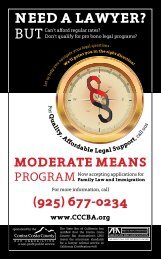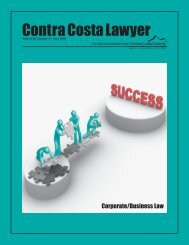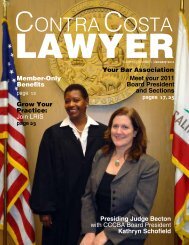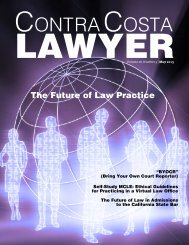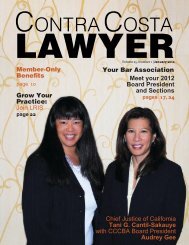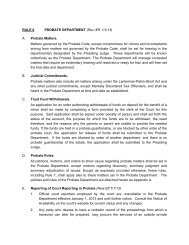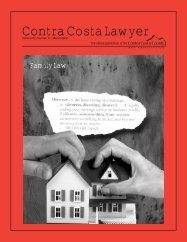Alternative Dispute Resolution Issue - Contra Costa County Bar ...
Alternative Dispute Resolution Issue - Contra Costa County Bar ...
Alternative Dispute Resolution Issue - Contra Costa County Bar ...
You also want an ePaper? Increase the reach of your titles
YUMPU automatically turns print PDFs into web optimized ePapers that Google loves.
Mediation and SeniorsThe Perfect Match?by Arlene SegalMediation, properly managed, is farmore than a settlement conference.Although it may lead to the same resolution,the process of mediation providesopportunities for the parties to fullyexplore and deal with the issues, the facts,and even the feelings involved. It allowsparties to tailor the resolution process totheir specific needs, with sensitivity to theneeds of all. The setting can be as formalas a law office conference room, or asfamiliar as a kitchen table. This can beparticularly effective when dealing withissues involving seniors.Whatever the setting, there are nostrangers present; no intimidating courtroom;no public record being made. Fora senior, this can be particularly important.There is protection from exposure of hispredicament — his sense of humiliation,embarrassment, intimidation, or evenbetrayal. All is confidential. There is nopublic display of his physical frailty or poormemory. There is no shame of having his“dirty laundry” aired for all to see.Mediation can provide an opportunityfor the senior to recount his story, but ina narrative form with which he is familiar.He can avoid the stress of having to sitthrough a court proceeding with hisantagonist staring at him, or of beingcross-examined by opposing counsel. Theelderly party can even be spared havingto sit in the same room with the per -petrator while the mediation proceeds.<strong>Alternative</strong>ly, and perhaps even better, hemay be able to sit across the table, hearwhat others have to say, and even talk tothem and begin to understand and restorevaluable relationships.The following are composite summariesof cases meant to illustrate some ofthe issues that can be confronted, avoidedor resolved in mediation. Additionally,they are meant to illustrate matters thatwould otherwise likely remain outside therealm of resolution by way of court proceedingsthat can be addressed andresolved in mediation.Case #1. Mr. H, 80 years old, had beenmarried to his latest wife for 30 yearswhen she died. After her death, he discoveredthat one of her daughters (“thedaughter”) by a previous marriage hadMrs. H execute a trust leaving everythingto Mrs. H’s daughters. All assets, includingjoint accounts, had somehow beentransferred to the trust. The daughterinsisted everything in the trust was Mrs.H’s separate property.While Mr. H was fully competent andcould recite every detail about every car,lawnmower or piece of household furniturehe had ever owned, he knew nothing abouthis finances for the 30 years of the marriage.Mrs. H had handled everything.Mr. H’s longstanding heart conditionwas not helped by the loss of his wife. Hewas further stressed by the loss of hisinvestment accounts and an annuity thathe had expected to support him in thecoming years. A proud man, he felt like afool for not knowing much about hisfinances. Even worse, he felt betrayed bythe daughter, and perhaps by his wife.Case #2. 65-year-old Mr. T was workingand an active member of his church. Apartfrom his work, his entire life and everyonehe knew was involved in the church. Inanticipation of retiring, he was greatlyencouraged when his personal friend,a fellow church-member and realtor,told him she had found a home that hecould afford. He borrowed from his retirementplan to make the down payment.Unexpected eye surgery forced him toretire before the purchase was completed.His income, which was not really sufficientto begin with, was now greatly reducedand totally inadequate. Property values,however, had been going up.Over a period of about a year, anotherfriend (the “friend”) a younger man andfellow church member, started comingby. He routinely took Mr. T out for lunchand spent time with him, and Mr. Tappre ciated the attention. The friendadvised Mr. T that he could (and should)borrow against the equity in the propertyand use the money to make his monthlypayments. He explained how this wouldeliminate Mr. T’s financial stress. Thefriend arranged for the loan. Mr. T didnot realize that he never received all ofthe cash pulled out of the equity. He alsodid not know that among the loan papershe signed was a Grant Deed, transferringthe property to his friend.After just a few months, Mr. T realizedthat he was still going to run out of moneyto make his payments and that he neededto sell. He called the realtor, who discoveredthe new deed. Mr. T was stunnedwhen he learned that his “friend” was thenew owner of his home.Case #3. Mrs. E’s husband died suddenlyjust a few months after he retired. It wasonly then that she discovered Mr. E hadleft all of his business interests and investmentsto his children from a previousmarriage. While she recognized that Mr.E did have a separate property interest inthe assets, the two of them had worked10 November 2009



